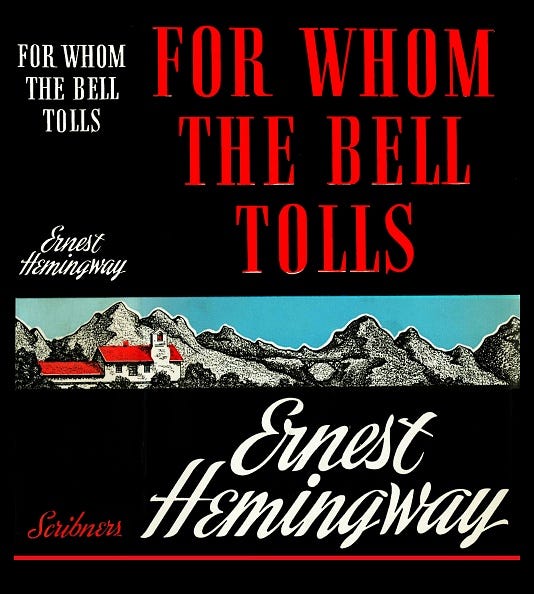The Writer's Almanac from Sunday, July 21, 2013
"The Shout" by Simon Armitage, from The Shout. © Harcourt Brace, 2005.
ORIGINAL TEXT AND AUDIO - 2013
It's the birthday of Ernest Hemingway, born in Oak Park, Illinois (1899). As a young man, he wanted to fight in World War I, but he had bad eyesight so he volunteered as an ambulance driver for the American Red Cross in Italy. Only one month after he started, he was passing out chocolates to Italian soldiers on the frontlines and got hit by shrapnel from an exploding shell. He spent several weeks in the hospital, where he started suffering from insomnia. He couldn't sleep without a light on for fear that he might die in the night. He traveled back to his parents' home, still recuperating from his injury.
Hemingway lived with his parents for months, occasionally hunting and fishing with friends. He wrote a few adventure stories about the war and sent them to the Saturday Evening Post, but they were rejected. His parents accused him of "sponging," told him to get a real job, and his mother finally threw him out of the house when he was 21. He got married, moved to Paris, and started hanging out with writers like Ezra Pound, James Joyce, and Gertrude Stein. He was forced to begin over again when he lost a suitcase that carried every manuscript and every copy of every manuscript he had written so far in Paris. Hemingway tried to write as simply and objectively as possible, using very few adjectives or adverbs. After he published For Whom the Bell Tolls in 1940, he began to struggle with his writing, worrying that he was repeating himself. But in 1953, The Old Man and the Sea was published, and the book won the Pulitzer Prize. A year later, Hemingway was awarded the Nobel Prize in literature.
It's the birthday of cartoonist Garretson Beekman "Garry" Trudeau, born in New York City, New York (1948), who is the famous, but media-shy, creator of the Doonesbury comic strip. Doonesbury was one of the first, and is still one of the only, comic strips to lampoon real people and real current events. He earned a Pulitzer Prize for editorial cartooning in 1975.
It's the birthday of Hart Crane, born Harold Hart Crane in Garrettsville, Ohio (1899). His mother was a Chicago debutante and his father was a very successful candy businessman who actually invented the Lifesaver, the popular ring-shaped mint.
By the time Crane was a teenager, he knew that he was gay, and he was fascinated by the life and career of Oscar Wilde. When his parents' marriage fell apart, Crane dropped out of school and took a train from Cleveland to New York to begin life as a poet. He loved being in New York, hanging out with poets like E.E. Cummings and Allen Tate. But he had trouble making a living there, couldn't hold down a job. His drinking got worse and in 1932, at the age of 33, he killed himself by jumping overboard a steamship on his way from Mexico to New York. He left behind his masterpiece, The Bridge (1930).
Be well, do good work, and keep in touch.®
September 28, 2024 – 5:00PM
Norsk Høstfest, Minot, ND
A Prairie Home Companion’s 50th Anniversary Tour with Garrison Keillor with Guests including CHRISTINE DIGIALLONARDO, RICHARD DWORSKY with HOWARD LEVY, CHRIS SIEBOLD, LARRY KOHUT, and our Radio Actors, TIM RUSSELL & FRED NEWMAN.






Ah, there was once a fine saying from WW2 that kept up the brief display of singular courage among our troops: "Keep 'em flyin'!" we said! I did and brought my nickel to classes back in '43 every week and got a bond. A bond is a good thing, Mr. K. Keep those shows coming. You are much more a seeding Johnny Appleseed of enjoyment for us. "Stick around! We need you!"
Some confusion for me: I've read Hemingway wanted to enlist but was too young at 17 and didn't have his parents' permission.
He appears to have signed up for Missouri National Guard infantry before America declared war but was rejected because of poor eyesight (age, too?). He then was accepted by the American Red Cross while he was working for the Kansas City Star. Who knows for sure? Help.
No confusion: Most say Hadley, Hemingway's first wife - not Hemingway - lost his works at a train station in Lausanne, Switzerland while en route to meet him. They say the valise containing the papers was left behind and stolen while she went for Evian water or something.
Hemingway turned 18 on July 21, 1917. America entered the war in April that year. He couldn't wait.The eyesight thing must have steered him to the American Red Cross. I think he was itchy to see action, and the eyesight thing must have been a factor. Obscenity another vision test!
He served well and truly as an ambulance driver; no doubt about that. I admire him for that.
Hemingway was an avid hunter as a kid and teen, and he later went on to slaughter hundreds of animals in Africa and had a keen eye for bullfights and rainbow trout despite his poor vision.
I'm not knocking Ernest Hemingway. Bottom line: I think he was really itchy to see action in WWI.
Please feel free to correct me.
I love Big Two-Hearted River and so many others - Up In Michigan, Three Shots. The Killers ...
Thanks for your time. Thanks Ernestly.
P.S. My grandfather (born 1896) fought in WWI in Belgium and France. He was 131st Infantry Division, Illinois National Guard (Chicago) originally, later 33rd (Golden Cross) Infantry Division overseas. It seems he was born (up in Holland, Michigan) wearing glasses; was avid hunter and fisherman as kid and teen; trained as a sniper in Texas wearing glasses. (I have photos).
I think Hemingway would have been accepted by the army had he waited. But he couldn't. Itchy. Eager for adventure.
You know what? I've got the itch to read more Hemingway all of a sudden. And I will hoist a daiquiri or two in his honor.
Sorry to take up so much space.